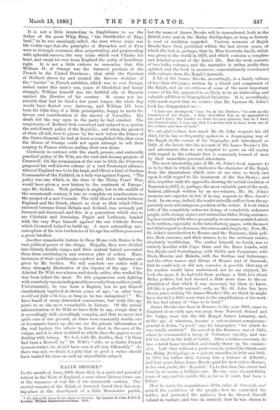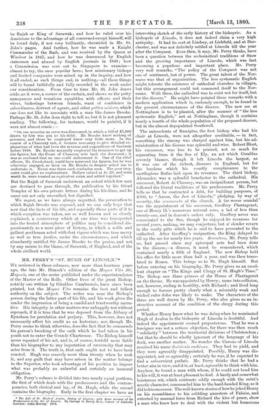RAJAH BROOKE.* Ix the mouth of June, 1868, there died,
in a quiet and peaceful retreat in the West of England, a man whose history forms one of the romances of real life of the nineteenth century. The mortal remains of the Rajah of Sarawak found their last rest- ing-place in the churchyard of a little Devonshire parish,
• The Life of Sir James Brooke, Rajah of Sarawak. By Spenser St. John, F.R.G.S. London: William Blackwood and Sons. 1879.
but the name of James Brooke will be remembered, both in the British Isles and in the Malay Archipelago, as long as history is read or tradition regarded. Various memoirs of Rajah Brooke have been published within the last eleven years, of which the best is, perhaps, that by Miss Gertrude Jacob, which was given to the world in 1876, and which contains a complete and detailed account of the hero's life. But the work consists of two bulky volumes, and the narrative is rather prolix than spirited, and the book is, moreover, conscientiously over-loaded with extracts from the Rajah's journals.
A life of Sir James Brooke, accordingly, in a handy volume of less than 400 pages, written by a friend and companion of the Rajah, and an eye-witness of some of the most important scenes of his life, appeared to us likely to be an interesting and valuable addition to biographical literature. It is, accordingly, with much regret that we confess that Mr. Spenser St. John's book has disappointed us :- I have not attempted," says he, in his Preface, " to sum up the character of the Rajah. I have described him as he appeared to me, and I leave the reader to form his own opinion; but as I have also formed mine, I may say that I consiiler him to have been one of the noblest and best of men."
We are glad to hear how much Mr. St. John respects his old. chief, for he has so frequently spoken in a disparaging way of the Rajah in the course of his biography, and introduced so little of the heroic into his account of Sir James Brooke's life and adventures, that we are tempted to quote an old saying with regard to the estimate that is commonly formed of men by their immediate personal attendants.
The most interesting part of Mr. St. John's book appears to us to be that in which he vindicates the character of the Rajah from the imputations which were at one time so freely cast upon it with regard to his treatment of the Sea Dyaks ; and this, together with the appendix showing the actual condition of Sarawak in 1877, is, perhaps, the most valuable part of the work. Indeed, although written by an eye-witness, Mr. St. John's memoirs are superior in few, if in any, respects to Miss Jacob's book. In one way, indeed, the reader actually suffers from the ap- parently more advantageous position of the writer. A book which tells of the completely unknown doings of completely unknown people, with strange names and unfamiliar titles, living and mov- ing in a country with whose geography we are unacquainted, needs to be written, especially in the introductory pages, with the most watchful regard to clearness, directness, and simplicity. Now, Mr. St. John's introduction to Borneo and the Borneans, their poli- tics, their customs, and their names, is, to the ordinary reader, absolutely bewildering. The author himself, no doubt, was so- entirely familiar with Cape Data and the River Lundu, with Sea Dyaks and Serradagang, with Siribs and Pangerans, with Muda Hassim and Makota, with the Seribas and Sakarangs, and the other names and things of Brunei and of Sarawak, that he could not, or did not, conceive it possible that any of his readers would have understood, not to say enjoyed, his book the more, if he had told them perhaps a little less about Malay politics, but had devoted a little more time to the ex- planation of that which it was necessary for them to know. All this is perfectly natural ; only, as Mr. St. John has been eleven years writing Sir James Brooke's life, we think he might have devoted a little more time to the simplification of his work. He has had plenty of " time to be brief."
James Brooke was born in Benares in the year 1803, came to England at an early age, ran away from Norwich School and Dr. Valpy, went into the 6th Bengal Native Infantry, and,
at the age of nineteen, became a sub-assistant commissary- general iu India, " a post," says his biographer, " for which he• was totally unfitted." He served in the Burmese war of 1825, where he commanded a troop of Volunteer cavalry, and was left for dead on the field of battle. After a tedious recovery, he was ordered home invalided, and finally threw up his commis- sion. Left thus without a profession, he visited the Straits and the Malay Archipelogo, as a private traveller, in 1830 and 1831. In 1835 his father died, leaving him a fortune of £30,000; and four years later, James Brooke paid his first visit to Borneo, in his own yacht, the Royalist.' Up to this time, his career had been by no means a brilliant one. He was over six-and-thirty years of age, and his public life, as far as it went, had been a failure.
How he made the acquaintance of the ruler of Sarawak, and gained the confidence of the people ; how he controlled the nobles, and protected the natives ; how he showed himself valiant in warfare, and wise in counsel; how he was chosen to- be Rajah or King of Sarawak ; and how he ruled over his dominions to the advantage of all concerned except himself, will be found duly, if not very brilliantly, chronicled in Mr. St. John's pages. And further, how he was made a Knight Commander of the Bath, and was received by the Queen at Windsor in 1847, and how he was denounced by English
statesmen and abused by English journals in 1848 ; how a Commission was sent out to Singapore to examine—
almost to try, the once popular hero ; how missionary bishops and limited companies were mixed up in the inquiry, and how it all ended, as such things end, in nothing,—all these things will be found faithfully and fully recorded in the work under our consideration. From time to time Mr. St. John draws aside, as it were, a corner of the curtain, and shows us the petty annoyances and vexations squabbles with officers and their wives, bickerings between friends, want of confidence in subordinates, distrust of agents, and other petites miseres, which one does not like to associate with a man like James Brooke. Perhaps Mr. St. John does right to tell us, but it is not pleasant reading. The following, for instance, would be painful, if it were not almost comic
" On one occasion an error was discovered, in which a bill of £1,000 drawn by him was put to his debit. Mr. Brooke knew nothing of accounts, and those he employed knew very little more. In the coarse of a Chancery suit, it became necessary to give detailed ex- planations of what had been the revenue and expenditure of Sarawak before 1848. Mr. Brooke naturally employed his treasurer to get up the figures, but the Court of Chancery sent back the document ; it was so confused that no one could understand it. One of the chief officers, Mr. Crookshank, could have mastered the figures, but he was otherwise engaged, so later on Mr. Brooke in despair asked me to undertake it. Never was there such confusion seen. The poor trea- surer could give no explanations. Dollars valued at 4s. 2d. and reals worth 3s. were treated as equivalent coins, and added together."
But the Rajah of Sarawak underwent an ordeal which few men are destined to pass through, the publication by his friend Templer of his own private letters during his life-time, and he came out not only unscathed, but dignified.
We regret, as we have always regretted, the persecution to which Rajah Brooke was exposed, and we can only hope that now that the facts of his life, and especially those parts of it to which exception was taken, are so well known and so clearly explained, a controversy which at one time was transported into the heated atmosphere of politics may be considered dis- passionately as a mere piece of history, in which a noble and gallant gentleman acted with that vigour which was true mercy as well as true justice, under the circumstances, and which abundantly entitled Sir James Brooke to the praise, and not by any means to the blame, of Sarawak, of England, and of the whole civilised world.



































 Previous page
Previous page